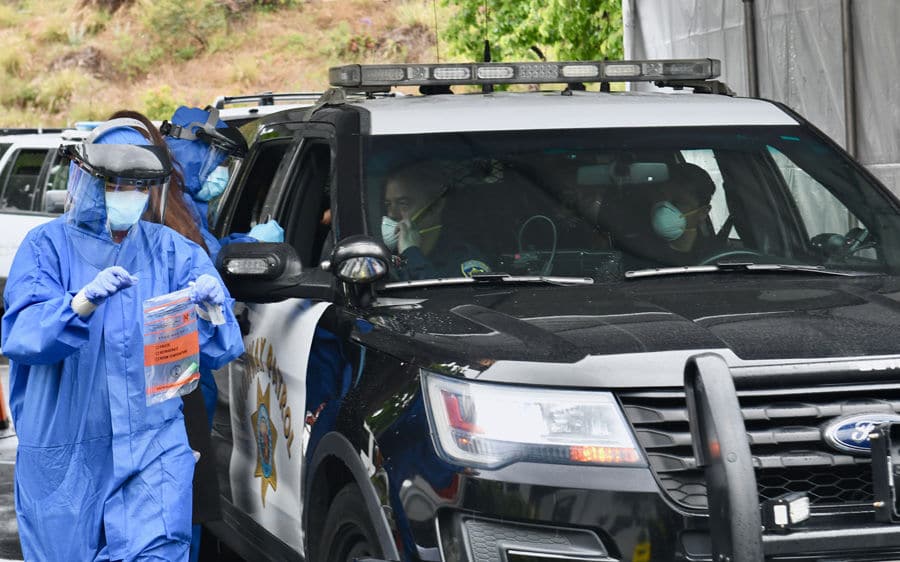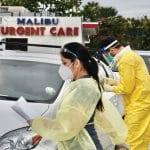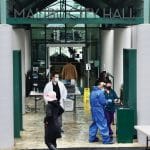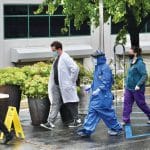
As of Tuesday afternoon, April 7, there were nine confirmed cases of COVID-19 among Malibu residents, following weeks of speculation regarding the number (or existence) of cases.
On Thursday, April 2, the first five confirmed cases were reported by LA County Department of Public Health. Thursday was the first day county officials released area-specific testing data for communities with populations under 25,000.
That number increased to eight by the afternoon of Friday, April 3.
Confirmed cases of the disease, caused by the novel coronavirus, were expected to continue to increase county-wide as testing ramps up, including the first widely available testing to take place in Malibu.
The City of Malibu and nonprofit CORE (Community Organized Relief Effort), founded by actor Sean Penn, held the first of several days of COVID-19 testing at City Hall on Monday, April 6, offering free tests to first responders (law enforcement, firefighters and healthcare professionals) and essential workers in Malibu. Free tests for first responders and essential workers continued on Tuesday. From April 8-11, members of the greater Malibu community were invited to get tested for a fee of $125. The tests were conducted by a team of professionals including Dr. Lisa Benya and others from Malibu Medical Group.
On the other side of Pacific Coast Highway, on Monday and Tuesday, Malibu Urgent Care and Malibu Foundation offered free tests for community members who pre-registered online. Over the two days, Malibu Urgent Care Center (with testing conducted by Dan Katz, MD) provided 300 tests to the community.
Each site was using what’s known as a Nasopharyngeal Test, meaning a swab is inserted far up the patient’s nose.
The two testing sites represent the first large-scale testing conducted in the Malibu community and, for many, the first opportunity to undergo a COVID-19 test.
Results from those tests take approximately two to three days before they are available, which suggests the number of people known to be infected with COVID-19, the disease caused by the novel coronavirus, may begin to rise in Malibu beginning Wednesday or Thursday.
Guidance for small businesses
With the COVID-19 crisis crippling small businesses, State Senator Henry Stern held a virtual town hall Monday afternoon to provide some answers and resources to those affected economically in this unprecedented time of uncertainty.
Stern warned that there would be some “sobering, upsetting news in this perilous economic time—folks are hurting.”
One guest speaker, Ray Bowman of the Economic Development Collaborative, said his taxpayer funded organization could be a great resource for small business owners. The scope of his work has more than tripled in the last three weeks with small to medium companies seeking technical assistance. It can be reached at EDCollaborative.com or 805.409.9159.
“We provide guidance and disaster response. Advisors can guide through loan programs, unemployment assistance and answer questions about human resource considerations, contracts and marketing. We’re recommending businesses contact their insurance provider. Like in any other disaster it’s important to know what’s covered and what’s not. It’s also important to apply for unemployment programs.”
That touched on a frustration covered in the virtual meeting—the long waits trying to apply for unemployment assistance. With thousands of business owners and employees flooding the Employment Development Department’s website, Monday’s participants said sites crashed. 818 Brewery owner Bryan Olson said some of his furloughed employees complained the EDD website made errors in their applications. With a brewery that was going “200 miles per hour and then hit a wall” after the coronavirus shutdown, that was just another headache. Stern called the web glitches “unacceptable” and promised he would “push at the state level” to fix problems.
With 90 percent of the state’s hospitality workers’ jobs gone or hanging by a thread, Stern encouraged anyone affected to apply for government assistance. The senator clarified that gig workers are eligible for unemployment insurance and stated one could apply even if they left their job due to risk of exposure to COVID-19.
Businesses have a couple of Small Business Administration loan options.
“The advantage to an economic injury loan is that even though it only gives forgiveness up to about $10,000 it’s long term—15-30 years at roughly 3.75 interest,” Bowman explained. “Payments aren’t due for 11 months. Paycheck forgiveness programs have to go through banks. It’s a program ‘til June with a two-year-term loan. Most of the feedback we’re getting from clients is that if they don’t have an existing relationship with that bank, very few banks have been willing to look at a new client relationship. I only know of one willing to look at new customers. Most banks only want to talk to existing clients. You can apply for both loans, but the uses of the money can’t crossover.”
Finally, Stern encouraged, “Be noisy. Reach out to us. We’re here to be your advocates. As for federal help, the Treasury Secretary said [it] was coming in two weeks, I pray that he’s right.”





